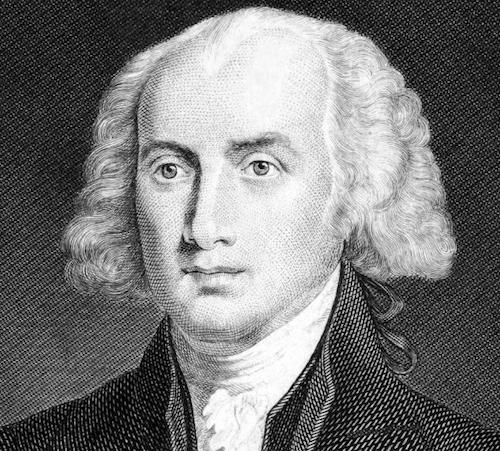The fourth President of the United States, James Madison was born on the 16th of March 1751, he died on the 28th of June 1836.He served as a politician much of his adult life. In 1789, Madison became a leader in the new House of Representatives, drafting many basic laws.
He is notable for drafting the first ten amendments to the Constitution, and thus is known as the “Father of the Bill of Rights”. Madison worked closely with President George Washington to organize the new federal government.
His early years were spent at Mount Pleasant, the first house built on the Montpelier plantation. At age 12, Madison’s father sent him to Donald Robertson’s school in King and Queen County. There Madison studied arithmetic and geography, learned Latin and Greek, acquired a reading knowledge of French, and began to study algebra and geometry.
Madison enrolled in college at the College of New Jersey (today known as Princeton University), earning a bachelor’s degree in 1771. He continued his education at Princeton through the next winter, studying Hebrew and ethics.
Madison overworked himself in order to complete two years of coursework in one. In 1787, the Continental Congress called for a Federal Convention to consider revisions to the Articles of Confederation.
Madison gave serious thought to the problems facing the nation and made specific proposals for devising a new constitution which, when presented by his state’s delegation, became known as the Virginia Plan. This was the first plan considered by the Convention, and many of its elements were incorporated into the Constitution in its final form.
He was appointed to the Electoral College for the election of 1800, an election famously thrown to the House of Representatives when the Electoral College vote was tied between Thomas Jefferson and Aaron Burr.

Madison was inaugurated as the fourth president of the United States (1809-17), inheriting the unresolved issues stemming from the war between France and Great Britain. Each nation attempted to prevent its rival from trading with the United States.
Madison called on Congress to declare war against Great Britain in 1812. In Congress, he helped frame the Bill of Rights and enact the first revenue legislation. Out of his leadership in opposition to Hamilton’s financial proposals, which he felt would unduly bestow wealth and power upon northern financiers came the development of the Republican, or Jeffersonian, Party.
As President Jefferson’s Secretary of State, Madison protested to warring France and Britain that their seizure of American ships was contrary to international law. The protests, John Randolph acidly commented, had the effect of “a shilling pamphlet hurled against eight hundred ships of war.”
Madison retired to his plantation in Virginia. However, he still stayed involved in political discourse. He represented his county at the Virginia Constitutional Convention (1829).
He also spoke against nullification, the idea that states could rule federal laws unconstitutional. His Virginia Resolutions were often cited as a precedent for this but he believed in the strength of the union above all.
James Madison died at Montpelier on June 28, 1836.